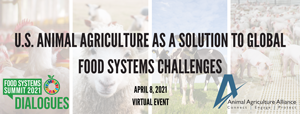
Written by: Victoria Broehm | April 14, 2021
 Last week, the Animal Agriculture Alliance brought together over 100 individuals representing a cross section of the U.S. food and agriculture industry to openly discuss the diverse challenges that are preventing affordable, animal-sourced foods from reaching those who need it most. What participants said was astounding – that many of the United Nations’ 2030 Sustainable Development Goals (SDGs), such as ending global hunger or reducing our environmental impact, are within reach with the game-changing, sustainable solutions already in the pipeline.
Last week, the Animal Agriculture Alliance brought together over 100 individuals representing a cross section of the U.S. food and agriculture industry to openly discuss the diverse challenges that are preventing affordable, animal-sourced foods from reaching those who need it most. What participants said was astounding – that many of the United Nations’ 2030 Sustainable Development Goals (SDGs), such as ending global hunger or reducing our environmental impact, are within reach with the game-changing, sustainable solutions already in the pipeline.
As you may recall from a recent blog post from AFIA’s President and CEO Constance Cullman, the U.N. secretary-general launched the Food Systems Summit this year with the goal of developing and unveiling “bold actions” to guide countries around the world in transforming their food systems to achieve the SDGs. The Alliance’s independent dialogue allowed the U.S. animal agriculture industry an opportunity to have a voice in the process, as notes from the forum will be directly provided to the U.N.
Jack Bobo, the CEO of Futurity, opened the forum with a short keynote presentation that set the stage on the stakes at risk for feeding a growing population in a sustainable way. For example, he explained that “conventional agriculture will deliver most of the gains necessary to save the planet,” but that the public, not science, continues to call the shots. He warned that drastic calls for a reduction in the production or consumption of certain foods do not account for efficiency gains made in various countries’ agricultural systems, and so suggested that any policy recommendations that come out of the summit are adaptable to local environments.
Elise Golan, Ph.D., the director for sustainable development at the U.S. Department of Agriculture, agreed with him on the last point. She spoke briefly on the USDA’s work on the summit and urged that any policy recommendations coming out should not be overly prescriptive, as there is no one-size-fits-all approach, and should be supported by science, while acknowledging the tradeoffs.
After the speakers’ presentations, we split into small focus groups, where participants discussed the obstacles and potential solutions for addressing them based on their given “Action Tracks.” I had the opportunity to listen in to action track one, which addresses access to safe and nutritious food for all. Of note, the participants in my group discussed: consumers’ lack of understanding on new technologies and practices, the role that culture plays in diets, the need to provide farmers with incentives to adopt new practices or use new equipment to reduce their environmental impact, the need for innovation to produce more with less, and the need to preserve farmers’ livelihoods.
The participants offered a few solutions for the U.N. to consider, including: meeting the demand for animal protein in a net-zero environment, using block chain throughout the food supply chain, harmonizing global regulatory systems so there is a quicker review process for new technologies, regulating the use of marketing language to overcome misinformation and supporting bringing up production practices around the world.
The Alliance will be providing a summary of the event that will be submitted to the FSS leadership and be published on the Summit Dialogues website in the coming weeks. For questions, leave us a comment below!
Comments See our policy on comments